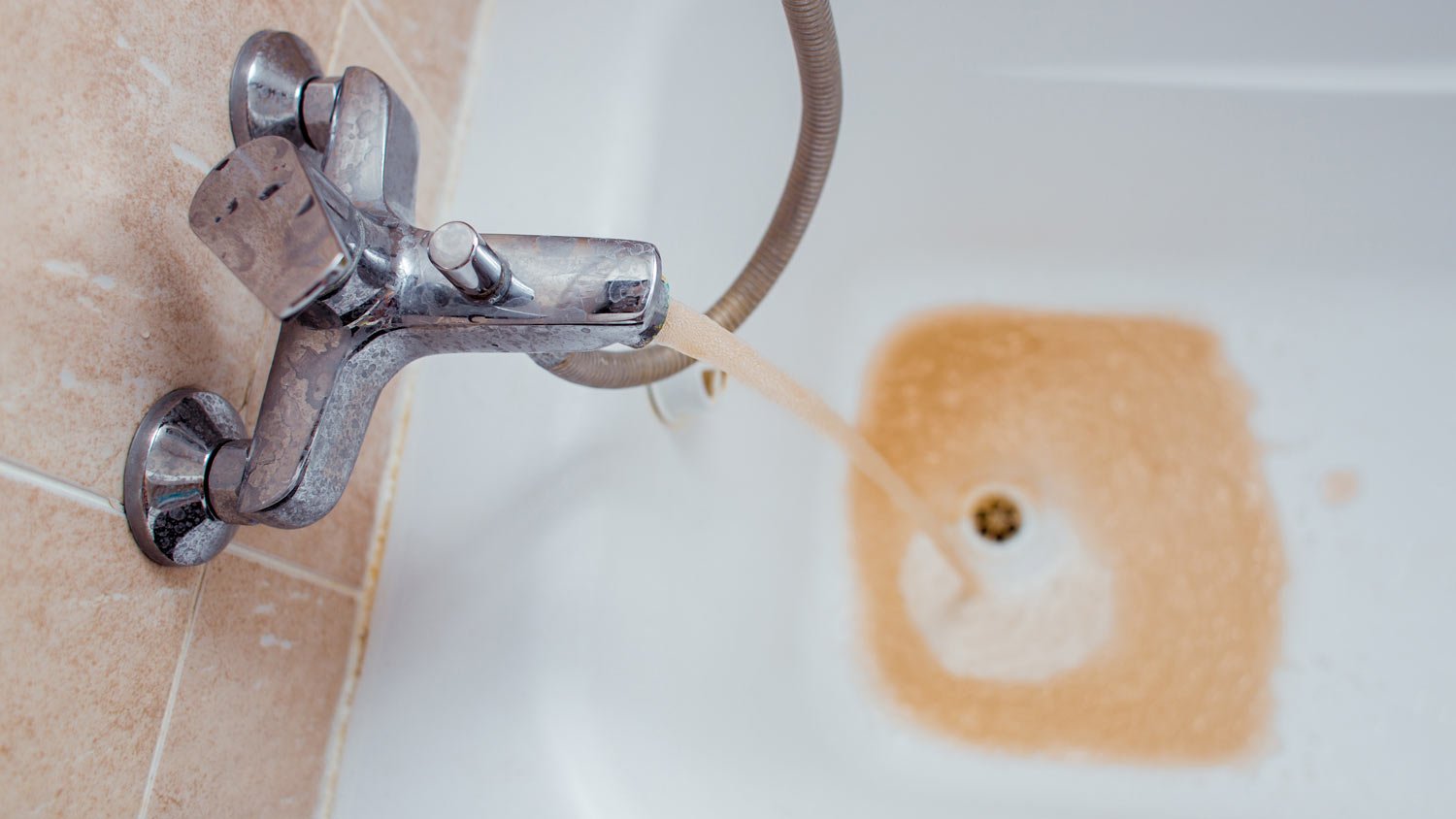Why Is My Bath Water Brown? 4 Reasons Why and How to Fix It
Dark bath water may leave your home feeling a little too rustic


Rust and iron are the leading causes of brown bath water.
Try to flush your system over some hours or days.
Call a pro if your water isn’t clear within 24 hours.
Don’t wash any laundry until your water runs clear.
Nothing helps you wind down at the end of the day quite like a nice, relaxing bath—until you notice the water is anything but crystal clear. While seeing dark-hued H2O coming out of the tap is enough to make anyone squeamish, take heart. Chances are there’s a logical (and un-scary) explanation. Let’s dive into the reasons your bath water is brown, and what you can do about it.
1. Rusty Pipes or Water Heater Tank
Most of the time, brown bath water is from rust or iron buildup. If the brown water lasts longer than a day or seems to be getting gradually worse over time, you’ll need to find the source. To zero in, check if both your hot and cold water are brown. If it’s only your hot water, the buildup is likely in your water heater, not your pipes. In such a case, you may need to contact a local water heater repair pro.
How to Fix It
Call a pro to flush your water heater.
They may also check your pipes by opening junctions or with a camera.
Ask whether adding a water softener may help.
2. Your City Flushed the Fire Hydrants
This reason for brown bath water isn’t the first thing people think of, but it happens surprisingly often, usually in the summer. Fire hydrants need to be flushed to ensure high water quality and eliminate any rust build-up in the system.
How to Fix It
Ask your neighbors. Other people will have the same problem if it's the local pipes.
Wait an hour or so, then run a few taps and flush toilets to clear the system.
3. Faulty Filters
This is more common in homes with well water—or another type of private water system—than ones running on a municipal system. Most filters only last 6 months to a year, so if you haven’t replaced them lately, it may be time for a swap. If you replaced them recently, make sure they’re properly installed. If you’re sure your filters are in good condition and installed well, follow the filter to the well itself—there may be problems there.
How to Fix It
Check and replace old filters.
Make sure the well itself isn’t throwing off rust.
If the problem persists, a local well pump contractor can help.
4. Iron Buildup

Homes have many pipes and water sources, which are all excellent places for iron to build up over time. The iron in the water reacts with oxygen and oxidizes, turning it brown. This is less of an issue in urban zones where the city more heavily filters water before it enters your home. Iron buildup in pipes, unfortunately, often requires you to replace that section of pipe.
How to Fix It
Try installing a water softener to prevent further buildup.
You may need a plumber to replace sections of plumbing.
Call your city and see if anyone else is having the same problem.
When to Call a Pro
Brown bath water can clear up on its own, but if it doesn’t after a day or so and none of your DIY fixes prove successful, it’s time to call a local plumbing repair pro to address the issue and ensure your water is safe.
Frequently Asked Questions
You can do a basic home water test, but we recommend having a pro conduct a more in-depth test. This method is accurate, and you’ll have a pro who knows your house helping you determine a plan of attack for anything out of the ordinary.
Most of the time, the answer is yes, but with an enormous asterisk. While an increase in iron deposits isn’t likely to harm you if consumed, that doesn’t mean you should drink any brown water from your faucets. In our book, it’s better to be safe than sorry and opt for bottled until the issue is resolved.
You usually don’t need to purify water that’s already filtered, but doing so can also remove viruses that filtering doesn’t. The tried and true method of purifying water is boiling it for at least 20 minutes. If you need to purify a large amount quickly, consider purifying tablets. Keep in mind that freezing the water only slows down pathogens; it doesn’t kill them like boiling does.





- Gas Plumbers
- Plumbing Repairs
- Sump Pump Installation
- Wood & Pellet Stove Repair
- Shower Repair
- Wood Stove Services
- Emergency Plumbers
- Fire Sprinkler Contractors
- Perc Test Companies
- Toilet Repair & Installation
- Boiler Repair
- Sewer Line Repair
- Faucet Repair
- Main Drain Camera Companies
- Foundation Drain Installation
- French Drains
- Bathtub Replacement
- Subcontractors
- Storm Drain Contractors
- Affordable Plumbing
- Plumbing & Heating Companies
- Bathroom Repair Services
- Sink Installation
- Commercial Plumber
- Barndominium Builders
- Water Line Repair
- Faucet Installation
- Water Line Installation
- Leak Detection










